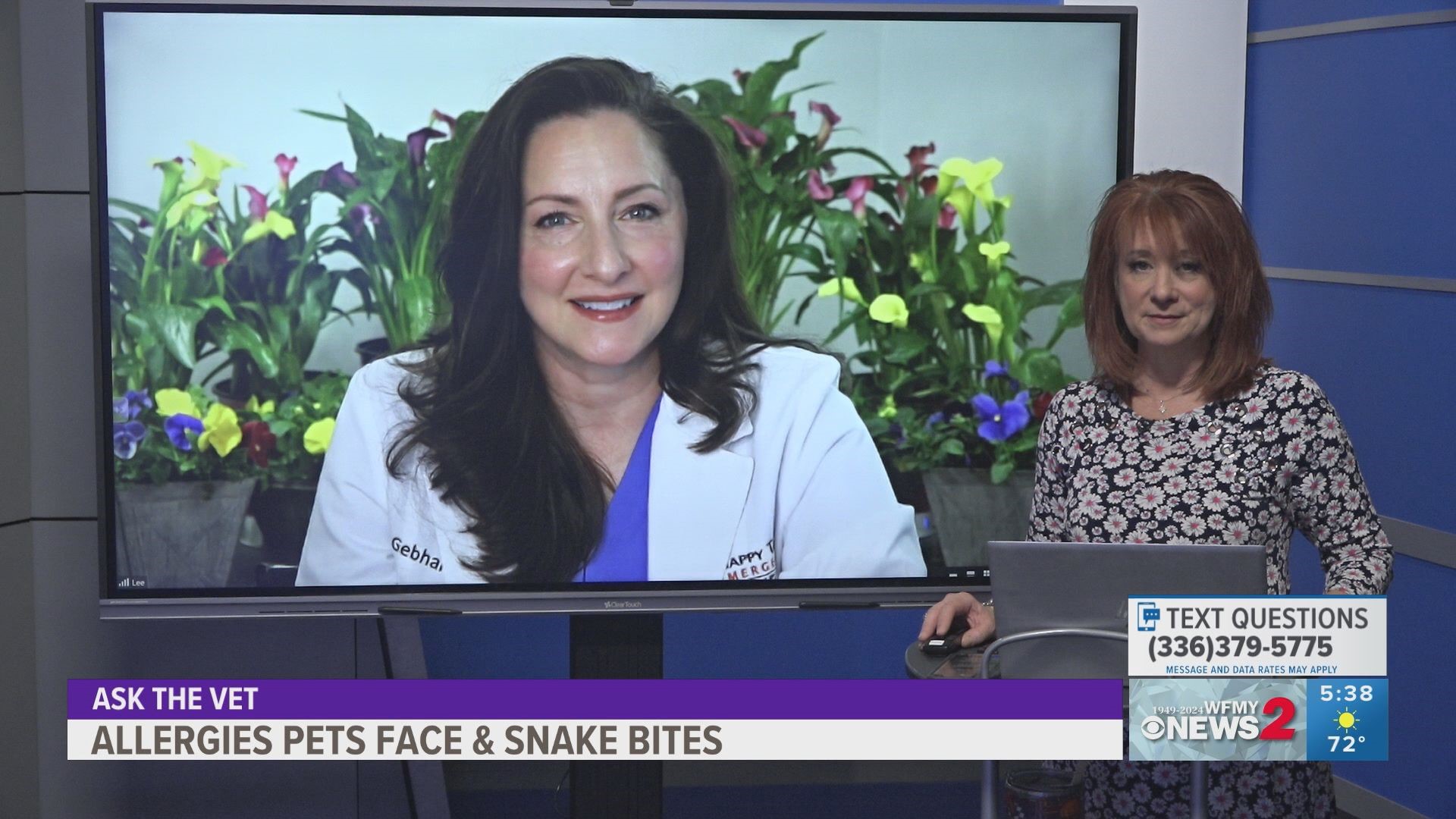Dr. Kelley Gebhardt from Happy Tails Veterinary Emergency Clinic is here to answer your questions.
GREENSBORO, N.C. — Spring has arrived (or is on its way), which means it's time to talk about outdoor animal safety when it comes to snakes and allergies.
Dr. Kelley Gebhardt from Happy Tails Veterinary Emergency Clinic joined 2 Wants To Know to discuss these topics and answer your questions.
Spring marks the beginning of snakebite season in North Carolina. Snake bites occur most frequently from March to October, when the snake is most active. Being bitten by a snake means everytime This is an emergency and can be fatal if not treated immediately.
Reduce the risk of encountering a snake.
Keep your garden clear of wood piles, underbrush, bushes, and other objects.
Get rid of rodents to prevent snakes from visiting your home and garden.
Keep your pet on a leash when walking and avoid walking around tall grass, bushes, and rocks.
Snakes can attack at a distance equal to half their body length.
Familiarize yourself with the snakes commonly found in your area. If your pet is bitten, identifying the snake may help with treatment.

Recognize the symptoms of a snake bite:
The fang marks may or may not be visible.
Local or generalized swelling, redness, or purple skin
From tenderness to severe pain
lameness, lethargy, weakness, collapse
What to do if you think your pet has been bitten:
See a veterinarian for your pet immediately.
Do not use ice packs, ice, tourniquets, alcohol, allow the wound to bleed, or try to suck out the poison.
Keep your pet calm. Limit their activities.
If your pet is bitten on the neck, remove the collar.
Do not capture or kill the snake to take it to the vet.
************************************************* * ***
What types of allergies does my pet have?
- Fleas (flea allergy dermatitis – the most common skin disease in dogs).
- Environment – Insects (bees, wasps, etc.), trees, grass, pollen, dust mites, mold, other dogs and cats.
- Food – This can be caused by proteins, carbohydrates, preservatives, or food dyes.
- Vaccine reaction.
- If your pet's allergy symptoms are worse during certain times of the year (spring or fall), it most likely has seasonal environmental allergies.
- If your allergy symptoms remain the same throughout the year, you may have a non-seasonal environmental allergy, flea allergy, or food allergy.
What are the symptoms of allergies?
- Relentless scratching and biting (feet, body, ears, base of tail, whole body).
- pink or red skin.
- Hair removal.
- Secondary skin infections caused by scratching or biting.
- Ear infections – The most common cause of ear infections in dogs is allergies.
- Cat asthma.
- Urticaria and facial swelling.
- Severe allergic reactions can cause vomiting, diarrhea, weakness, and collapse.
Why is it important to address your pet's allergies?
- Most importantly, it improves your pet's overall comfort and quality of life.
- Prevents secondary infections (skin infections, ear infections) caused by skin irritation, scratching, and chewing.
- A happy by-product of managing pet allergies is that you can save money by eliminating the need to treat secondary infections that require antibiotics, antifungals, steroidal anti-inflammatories, and medicated baths. That's it.
How are allergies diagnosed?
- To definitively diagnose an underlying environmental allergy, your pet will require allergy testing by a dermatologist veterinarian. This includes skin and blood tests to check for certain underlying allergies. These tests allow dermatologists to create allergy shots (allergen-specific immunotherapy) to reduce your pet's sensitivity to allergens.
- If you suspect a food allergy, we recommend limiting your pet's diet to foods that they have never eaten before. If allergy symptoms subside, start feeding your pet a special diet.
What is the treatment for allergies?
- For dogs with flea allergies, 100% flea control is essential. Flea allergies are caused by flea saliva. A single flea bite is enough to cause allergy symptoms. All pets in the household should be on appropriate flea preventive medication year-round.
- Allergy symptoms are treated with medicine. Long-term use of some anti-allergy drugs, such as steroids, can cause other health problems. Fortunately, there are many new medications available to reduce allergy symptoms in pets, and these medications have few side effects. These medications do not cure the allergy, but reduce the symptoms. If the underlying allergy is not addressed, symptoms will return when the medication is discontinued.
- Treat underlying secondary infections (skin, ear, etc.) with medicines and baths.
- Avoid or limit exposure to environmental allergens. It is impossible to remove all allergens from the environment. However, bathing helps remove allergens from your pet's skin and reduces exposure/contact time. A soothing cream rinse or spray moisturizes the skin and reduces itching.
- Allergies are usually not curable and are managed and controlled throughout your pet's life.


